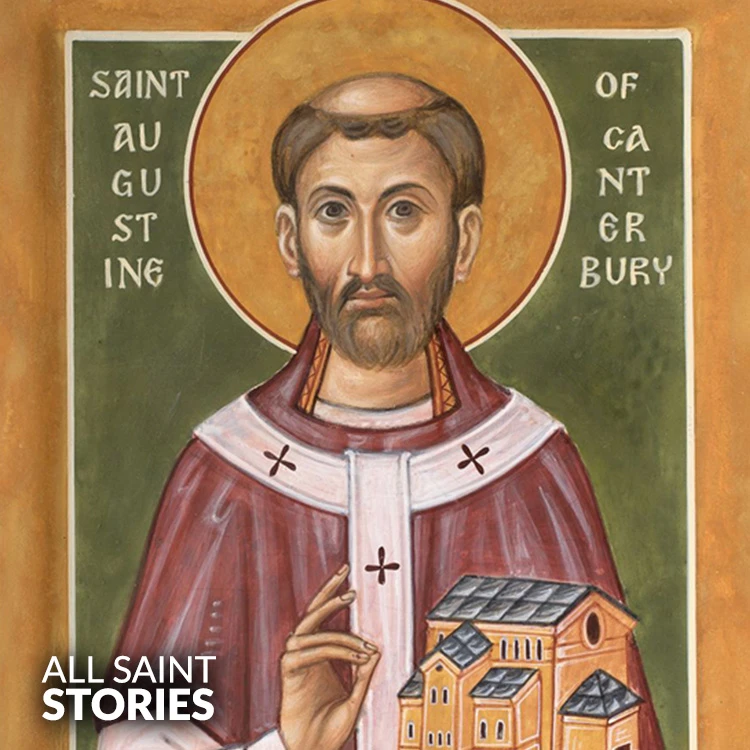"Saint Augustine of Canterbury, Faithful servant of God, Guide us in our journey of faith and compassion. Help us to be bold in proclaiming the Gospel, and to live in unity and love. Intercede for us, that we may grow in holiness, and lead others to the light of Christ. Amen."
ST. AUGUSTINE OF CANTERBURY
ST. AUGUSTINE OF CANTERBURY

St. Augustine of Canterbury was a Benedictine monk and the first Archbishop of Canterbury. Known for his missionary work, he is credited with converting the Anglo-Saxons to Christianity and establishing the foundation for the Church in England. His efforts to spread the faith were instrumental in bringing Christianity to the British Isles, and he is often referred to as the "Apostle of the English."
St. Augustine of Canterbury, originally a Benedictine monk from Rome, was sent by Pope Gregory the Great in 596 to evangelize the Anglo-Saxons. Augustine was accompanied by a group of monks, and after a challenging journey across the English Channel, they landed in Kent. King Æthelberht of Kent, married to a Christian princess from France, welcomed Augustine and the missionaries with hospitality. Augustine's patience, diplomatic skills, and dedication eventually led to the conversion of King Æthelberht, along with many of his subjects.
As a missionary bishop, Augustine quickly set up a church in Canterbury and established it as the seat of the first Archbishop. He also promoted the establishment of monasteries and churches throughout the country, which became central to the spread of Christianity across England. Augustine helped organize the first Synod of the Church in England, ensuring that the new Christian community adhered to the teachings of the Church of Rome, and established the practices for the English Church to follow. His work had a lasting influence on England's religious structure, and he is remembered as a pioneer in spreading Christianity to the Anglo-Saxons.
In recognition of his contributions, St. Augustine was buried in St. Augustine's Abbey in Canterbury, where his tomb became a pilgrimage site. Although there are no records of his formal canonization, he is widely revered as a saint in the Catholic Church and the Anglican Communion. His legacy endures as the patron saint of missionaries, and his work has earned him the title "Apostle of the English." His feast day is celebrated on May 27.
Video Not Found
The information on this website is compiled from various trusted sources. While we aim for accuracy, some details may be incomplete or contain discrepancies.
If you notice any errors or have additional information about this saint, please use the form on the left to share your suggestions. Your input helps us improve and maintain reliable content for everyone.
All submissions are reviewed carefully, and your personal details will remain confidential. Thank you for contributing to the accuracy and value of this resource.
Credits & Acknowledgments
- Anudina Visudhar (Malayalam) – Life of Saints for Everyday
by Msgr. Thomas Moothedan, M.A., D.D. - Saint Companions for Each Day
by A. J. M. Mausolfe & J. K. Mausolfe - US Catholic (Faith in Real Life) – Informational articles
- Wikipedia – General reference content and images
- Anastpaul.com – Saint images and reflections
- Pravachaka Sabdam (Malayalam) – Saint-related content and insights
We sincerely thank these authors and platforms for their valuable contributions. If we have unintentionally missed any attribution, please notify us, and we will make the correction promptly.
If you have any suggestion about ST. AUGUSTINE OF CANTERBURY
Your suggestion will help improve the information about this saint. Your details will not be disclosed anywhere.
© 2026 Copyright @ www.allsaintstories.com



 English
English
 Italian
Italian
 French
French
 Spanish
Spanish
 Malayalam
Malayalam
 Russian
Russian
 Korean
Korean
 Sinhala
Sinhala
 Japanese
Japanese
 Arabic
Arabic
 Portuguese
Portuguese
 Bantu
Bantu
 Greek
Greek
 German
German
 Dutch
Dutch
 Filipino
Filipino